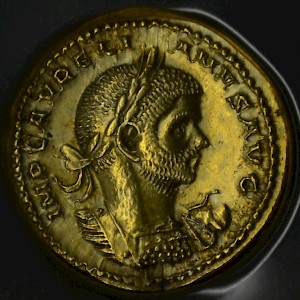Zosimus, New History 1
Zosimus (Greek Ζώσιμος): Early Byzantine, pagan author of a history of the Roman Empire, published in the first quarter of the sixth century CE.
Book 1

Zosimus’ first book begins with some remarks about the causes behind the historical process, which must be
either fatal necessity, the influence of the planets, or the will of the Deity, which regards with favor all our actions while they are just and virtuous,note
It was this cause that made Rome a great power but has also caused its decline. Next, Zosimus offers a very brief Greek history from the Trojan War to Alexander the Great, followed bt an account of the Roman Republic and the origin of the Augustan Empire.
The emperors of the two first centuries are mentioned in increasing detail, with Zosimus paying quite some attention to the occupiers of the praetorian prefecture. At some indeterminable point, Zosimus starts to use information from the Universal History of Eunapius. For the age of the emperors Valerian (r.253-260), Gallienus (r.260-268), Claudius II (r.268-270), and Aurelian (r.270-275), Zosimus is one of our most important sources. This means he also is an important source for the history of the Palmyrene Empire, which ends with an account of the reliability of the oracles.
The first book ends with the reign of Probus (r.276-282). There is a lacuna that must have contained the reign of Diocletian (r.284-305) and his colleague Maximian (r.285-305).
Contents
- Introduction
- From the Trojan War to the Persian War
- Greece until Alexander
- Alexander the Great
- The rise of Rome; the nature of monarchy
- From Augustus to Domitian
- From Nerva to Didius Julianus
- Septimius Severus
- Caracalla, Geta, and Papinianus
- Macrinus
- Heliogabalus, Severus Alexander, and Ulpianus
- Severus Alexander
- Maximinus Thrax
- The Gordians
- Fall of Maximinus Thrax
- Rise of Gordian III
- Gordian and Themistheus
- Gordian's Persian war
- Coup of Philip
- Reign of Philip
- Philip send Decius to the Danube
- Revolt of Decius
- Decius defeats the Scythae
- Sack of Philippopolis
- Reign of Trebonianus Gallus
- Scythian successes
- More foreign attacks
- Rise of Aemilian
- Rise of Valerian
- Rule of Valerian and Gallienus
- More foreign attacks
- Barbarian raids on the Bosphorus
- Sack of Trapezus
- Sack of Chalcedon
- Sack of Nicomedia
- Valerian taken captive
- Italy invaded; Gallienus defends Rome
- Origins of the Gallic Empire
- Odaenathus and Zenobia
- The end of Gallienus
- Death of Gallienus
- Scythian attacks
- Claudius defeats the Scythians
- The Palmyrenes conquer Egypt
- Claudius pursues the Scythians
- Death of Claudius
- Accession of Aurelian
- Aurelian repels the Scythians
- Aurelian suppresses a rebellion in Rome
- Aurelian attacks Zenobia of Palmyra
- Aurelian takes Antioch
- Aurelian proceeds to Emesa
- Aurelian defeats the Palmyrenes
- Aurelian lays siege to Palmyra
- Zenobia arrested
- Aurelian captures Palmyra
- An oracle about Palmyra
- Another oracle
- Death of Zenobia
- Second revolt of Palmyra
- End of Palmyra and the Gallic Empire
- Death of Aurelian
- Reign of Tacitus
- Civil war between Florian and Probus
- Punishment of the murderers of Aurelian and Tacitus
- Rebellions
- Probus' Germanic war
- Probus defeats the Franks
- Crimes of Lydius
- Death of Lydius
- Frankish pirates